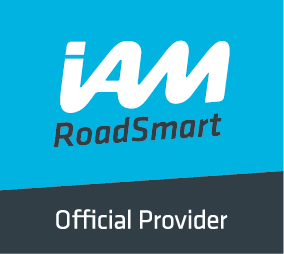How are you today?
A friend, who has been unwell during the last couple of years, is in isolation and had a birthday which coincided with a national celebration. I can’t really put on here how they described their day, however, I’m sure most of us can understand their frustration; achieving a milestone birthday which under normal socialising rules would be celebrated with a party, however this year it was a non-event. No doubt when we are able to celebrate as we have historically there will be a party to end all parties with cake and, well you don’t need me to explain. I can hear a few of you thinking, what has this to do with advanced driving. Let’s have a look.
We all like to be greeted by family, friends and acquaintances with, ”Hi, how are you today?" or a similar familiar greeting. In our daily lives, do we ever check ourselves before starting any of our numerous daily tasks? The ones that may be considered automatic, mundane, usual. You know, the ones that require little or no thought like making toast, a cup of tea or coffee, boiling an egg. I’m fairly sure the list is endless. But, do you ever ask before you drive, “How am I today?” I suspect many drivers don’t. Advanced drivers and those who drive for a living, most of whom will have taken a driving assessment, if not an advanced test, will ask. After all, they do their daily POWDERY checks, don’t they?
If you’ve taken an Advanced Driving Course, your observer might have greeted you with “Hi, how are you today?" did you ever ask what was the purpose behind the greeting? Many drivers will never consider themselves before getting into their car. Then driving not just themselves but their family and friends. Drivers may not be aware that a fifth of drink driving convictionsc happen the morning after the night before, whilst on the daily commute.
Why do observers ask the question, why do driving instructors ask their students, and why is it included in the daily checks by professional and advanced drivers? It is a pleasant greeting which has a far deeper significance. Asking the question enables the observer to gain information which gives an insight into the state of mind and if this could have an impact on how the intended session could develop. This will also indicate how the driver may deal with external influences outside their control. Will this have a negative impact on how any given situation is handled? When asked do you just give the ‘automatic’ reply “Fine thanks!” or do you consider how you are feeling at the moment in time? Does how you feel have an impact on how you will control the vehicle you are driving, or how you may react to the other road user who has pushed the envelope?
Whilst driving through Lincoln, along Broadgate towards Lindum Hill, is the car on the 30 mph dual carriageway just speeding, or are they trying to get their passenger who is having a medical emergency to the nearest hospital? I'm not doing anything wrong so I'm not going to move back to the nearside lane even though it is clear. Consider the last journey you made. Did anything happen that made you think? Have you ever arrived at a destination and then wonder how you got there? A friend in their early 40’s recalled they had driven to B&Q. Having parked the car they were shocked that they were in Sainsbury’s car park and had no recollection why or how they had managed to get there and they didn’t even need to visit the store! It is always extremely important, and not just during the current COVID-19 pandemic, that when asked we answer honestly. The result of not being truthful dare not even be contemplated.
Many will dismiss the purpose behind the question, however, how many of us can (with hand on heart) say that they have been behind the wheel of a vehicle when possibly they should not have been. How many have had one more alcoholic drink than they should, and driven? Probably less now than several years ago? How many have taken a Beecham’s powders or similar flu and cold remedy, then taken another paracetamol tablet and driven? Are you aware that if you have taken more than the recommended daily dose of paracetamol this may be detected (as a false positive) in a saliva test used by police? This may then require a blood test to clarify the result.
There was a serious crash where a vehicle towing a trailer had left the carriageway it rolled down an embankment and blocked a main railway line (Selby Rail Crash 2001)d The trial heard the driver fell asleep at the wheel after staying up all night chatting on the phone to a woman he met on the internet How many have ignored the telltale signs of sleepiness and continued to drive? Do we take regular breaks when driving even as advanced motorists? We can soon become overwhelmed by tiredness if we don’t take regular breaks. Taking a break before we become tired is much better than trying to overcome the onset of tiredness. A Google search for “Driver fell asleep at wheel” returned “about 9,200,000 results (0.46 seconds)” whilst “drivers fell asleep at wheel UK” returned “about 13,200,000 results (0.50 seconds) “
Driving when tirede, 3 has some suggestions for ways to avoid falling asleep at the wheel. As licence holders, we must tell the DVLA of any medical condition this can be found using the DVLA Medical condition checkf. Not doing so, can result in a fine of up to £1,000.
In 2018 Fleet news reported, “One in eight (13%) of drivers in the UK admit falling asleep at the wheel, according to new research by the AA Charitable Trust.”f
Whilst the greeting from your observer is pleasant, it should never be taken at face value. The reason behind the question is vitally important. Your observer gains insight into an area seldom considered regarding vehicle control. We have all accepted that whilst driving, we are in control of a potentially lethal machine, and we must ensure whilst driving, we remain in control. If we are not 100% we must take action to ensure that we, and those around us, remain safe.
One last note of caution, many drivers are currently not aware of other vehicles on the roads around them and change direction with little or no regard for others or for the use of mirrors or signals.
Most of all stay safe and enjoy the drive.
Andy Coward, ADI
Local Observer, IAM Lincolnshire
References
a. https://www.iamroadsmart.com/media-and-policy/news-and-insights/blog-post-details/is-your-vehicle-ready-for-the-drive-or-ride/2019/05/08/is-your-vehicle-ready-for-the-drive-or-ride
b, https://www.eurocarparts.com/blog/think-flower-essential-car-checks
c. https://www.autoexpress.co.uk/car-news/107003/a-fifth-of-drink-driving-arrests-are-made-the-morning-after
d. https://www.bbc.co.uk/news/uk-england-york-north-yorkshire-12591249
e. https://www.insurethebox.com/driving-when-tired/
f. https://www.gov.uk/health-conditions-and-driving
g. https://www.fleetnews.co.uk/news/fleet-industry-news/2018/11/02/one-in-eight-drivers-admit-falling-asleep-at-the-wheel-aa-research-finds


Write a comment